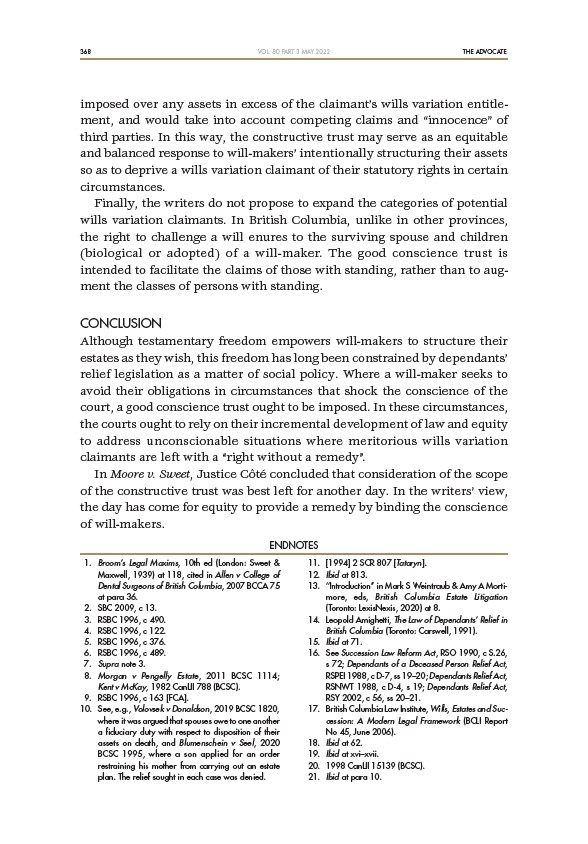
368 THE ADVOCATE
VOL. 80 PART 3 MAY 2022
imposed over any assets in excess of the claimant’s wills variation entitlement,
and would take into account competing claims and “innocence” of
third parties. In this way, the constructive trust may serve as an equitable
and balanced response to will-makers’ intentionally structuring their assets
so as to deprive a wills variation claimant of their statutory rights in certain
circumstances.
Finally, the writers do not propose to expand the categories of potential
wills variation claimants. In British Columbia, unlike in other provinces,
the right to challenge a will enures to the surviving spouse and children
(biological or adopted) of a will-maker. The good conscience trust is
intended to facilitate the claims of those with standing, rather than to augment
the classes of persons with standing.
CONCLUSION
Although testamentary freedom empowers will-makers to structure their
estates as they wish, this freedom has long been constrained by dependants’
relief legislation as a matter of social policy. Where a will-maker seeks to
avoid their obligations in circumstances that shock the conscience of the
court, a good conscience trust ought to be imposed. In these circumstances,
the courts ought to rely on their incremental development of law and equity
to address unconscionable situations where meritorious wills variation
claimants are left with a “right without a remedy”.
In Moore v. Sweet, Justice Côté concluded that consideration of the scope
of the constructive trust was best left for another day. In the writers’ view,
the day has come for equity to provide a remedy by binding the conscience
of will-makers.
ENDNOTES
1. Broom’s Legal Maxims, 10th ed (London: Sweet &
Maxwell, 1939) at 118, cited in Allen v College of
Dental Surgeons of British Columbia, 2007 BCCA 75
at para 36.
2. SBC 2009, c 13.
3. RSBC 1996, c 490.
4. RSBC 1996, c 122.
5. RSBC 1996, c 376.
6. RSBC 1996, c 489.
7. Supra note 3.
8. Morgan v Pengelly Estate, 2011 BCSC 1114;
Kent v McKay, 1982 CanLII 788 (BCSC).
9. RSBC 1996, c 163 FCA.
10. See, e.g., Volovsek v Donaldson, 2019 BCSC 1820,
where it was argued that spouses owe to one another
a fiduciary duty with respect to disposition of their
assets on death, and Blumenschein v Seel, 2020
BCSC 1995, where a son applied for an order
restraining his mother from carrying out an estate
plan. The relief sought in each case was denied.
11. 1994 2 SCR 807 Tataryn.
12. Ibid at 813.
13. “Introduction” in Mark S Weintraub & Amy A Mortimore,
eds, British Columbia Estate Litigation
(Toronto: LexisNexis, 2020) at 8.
14. Leopold Amighetti, The Law of Dependants’ Relief in
British Columbia (Toronto: Carswell, 1991).
15. Ibid at 71.
16. See Succession Law Reform Act, RSO 1990, c S.26,
s 72; Dependants of a Deceased Person Relief Act,
RSPEI 1988, c D-7, ss 19–20; Dependants Relief Act,
RSNWT 1988, c D-4, s 19; Dependants Relief Act,
RSY 2002, c 56, ss 20–21.
17. British Columbia Law Institute, Wills, Estates and Succession:
A Modern Legal Framework (BCLI Report
No 45, June 2006).
18. Ibid at 62.
19. Ibid at xvi–xvii.
20. 1998 CanLII 15139 (BCSC).
21. Ibid at para 10.